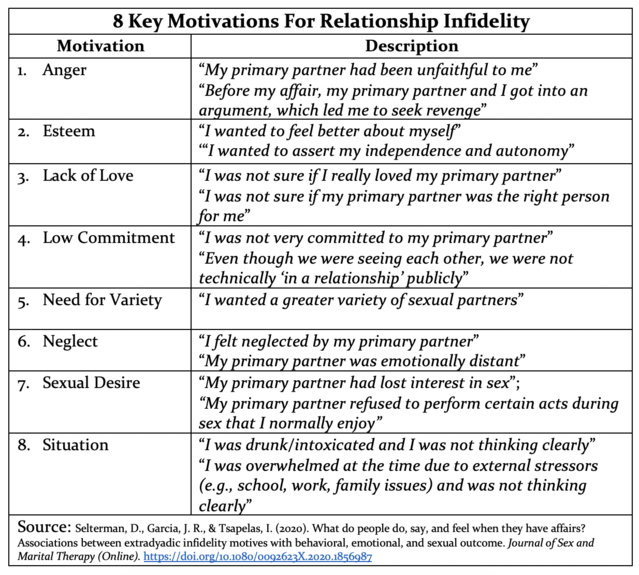Sex
The 8 Reasons Why People Cheat
There are many reasons why people are unfaithful and it's not always about sex.
Posted March 22, 2021 Reviewed by Lybi Ma
Key points
- There are eight key motivations that lead people to be unfaithful, and most don't involve sex.
- Many people cheat because of anger, lack of love, low commitment, esteem, and neglect. Plus, some cheaters want to be discovered.
- Women have longer affairs, and affairs were also longer and more emotionally satisfying when participants felt closer to their affair partner.

Cheating. It’s the ultimate relationship violation, and one of the most notorious relationship killers. But all affairs aren’t created equal. Some of these relationships are brief trysts, others are longer affairs. A partner’s infidelity can end the relationship, but not always. To understand how these different outcomes come about, we have to go back to the beginning. Why are partners unfaithful in the first place?
In the quest for answers, the most common culprit is to diagnose what’s missing from the relationship, especially sexually. But that type of blame game is an oversimplification that misses a lot of what’s really taking place. In fact, a recently published study by Dylan Selterman, Justin Garcia, and Irene Tsapelas found that only half of the cheaters reported having vaginal intercourse. Certainly, sex is part of the picture, but if cheating isn’t entirely about sex, then what’s motivating people to be unfaithful?
The Many Motivations for Cheating
Lots of reasons. The same study sampled 495 individuals who admitted to cheating in their relationship. To understand their actions, researchers gave them 77 items that all essentially asked: Why did you do it? The analysis revealed eight key motivations, most of which didn’t involve sex at all. For example, many said they cheated due to anger, lack of love, low commitment, esteem, situation, and neglect. Importantly, the reasons why they cheated not only impacted their affairs but their primary relationship as well.

The Anatomy of an Affair
Motivations for cheating impacted the length of affairs. When people cheated due to anger, lack of love, or variety, their affairs were longer, while those motivated by the situation had shorter affairs. Women also had longer affairs on average than men. Affairs were also longer and more emotionally satisfying when participants felt closer to their affair partner.
In the affairs, most (62.8 percent) admitted to expressing affection for the new partner and having sexually explicit dialogue (61.2 percent). Roughly 4 out of 10 (37.6 percent) had intimate conversations, while 1 in 10 (11.1 percent) said: “I love you.” Those who reported less emotional connection in their primary relationship had more intimacy with their affair partner, perhaps as a way to seek out missing fulfillment. The key motivation for greater emotional intimacy with affair partners was lack of love in the primary relationship. Similarly, when the affair was prompted by lack of love, individuals found the affair more intellectually and emotionally satisfying, but much less so when the situation motivated the affair.
Much of the sexual activity in affairs involved kissing (86.7 percent) and cuddling (72.9 percent). Mutual masturbation (53.5 percent), oral sex (46.4 percent, vaginal sex (53.3 percent), anal sex (6.1 percent), and no physical contact (5.7 percent) were all less common. Individuals were more satisfied sexually with their affair partner when they cheated due to sexual desire and variety, as well we lack of love, but not when they were cheating because of the situation. Men and women reported similar frequencies of sex with the affair partner and did not differ in their sexual satisfaction levels.
Do People Want to Get Caught?
We typically think of cheating as a clandestine enterprise, the success of which depends on not getting discovered. But some cheaters aren’t as careful as others, perhaps intentionally. Those cheating due to lack of love went on more public dates like going out to dinner or the movies. Kissing in public and other public displays of affection were more common for those motivated by lack of love, wanting to boost their own self-esteem, and those seeking more variety. Again, not exactly secretive behavior. Clearly, these individuals weren’t as concerned about getting caught and may have even wanted to get caught (i.e., the affair was an exit strategy). In each case, situational cheaters were less inclined to cheat out in the open, perhaps because they had no plans of ending their primary relationship.
Confessions of a Cheater
Why people cheat impacts how they handle it. For example, many cheaters confessed their affair. In fact, there was almost a 50/50 split between disclosers and secret-keepers. Women were more likely to fess up than men. Overall, those who came clean were more likely to have cheated initially out of anger or neglect, and not because of sexual desire or variety. Those motivations suggest that the confessions were likely a form of retribution and more about being nasty than noble. However, those who came clean were also more likely to form a committed relationship with the affair partner.
Cheating’s Aftermath: The Affair Partner
What happened with the affair partner? The affairs rarely resulted in real relationships with only one out of 10 of the affairs ultimately turning into a full-fledged committed relationship (11.1 percent). More commonly, people only saw that person occasionally (31.1 percent), with another third (29.9 percent) staying friends with their affair partner, and the remaining 25.5 percent shutting the affair partner out and having no contact with them. Those who cheated for situational reasons, or for reasons of variety, were less likely to have transitioned into a serious relationship and more likely to see their affair partner occasionally.
Cheating’s Aftermath: The Primary Relationship
For the primary relationship, surprisingly only 1 in 5 (20.4 percent) ended because of the affair. Near equal numbers (21.8 percent) stayed together despite their partner finding out, while slightly more (28.3 percent) stayed together with their partner never discovering the infidelity. The remaining relationships broke up for non-cheating reasons.
The reasons why people stray helped determine the relationship’s fate. The affair was more of a relationship killer when cheating was due to anger, lack of love, low commitment, and neglect, but not when infidelity was due to the situation. Though an emotionally impoverished primary relationship was the primary reason to end the relationship, having better as well as more frequent sex with the affair partner was also a factor.
Overall, these findings show that cheating isn’t as simple as seeking out sex. In particular, there appear to be two main motivators for cheating: the situation and a broken relationship (i.e., lack of love), with the latter leading to more serious affairs. While we can use these findings to identify warning signs in our own relationship, there’s a better way. These findings show the importance of strengthening our relationship’s emotional connection. Not only will that negate a major motivation for infidelity, but also help us have a more satisfying and committed relationship.
Facebook image: BAZA Production/Shutterstock
References
Selterman, D., Garcia, J. R., & Tsapelas, I. (2020). What do people do, say, and feel when they have affairs? Associations between extradyadic infidelity motives with behavioral, emotional, and sexual outcome. Journal of Sex and Marital Therapy (Online). https://doi.org/10.1080/0092623X.2020.1856987




